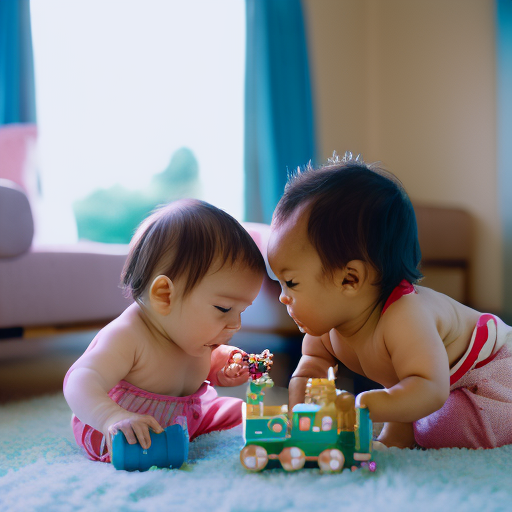"Cherishing Little Steps - A Haven for Baby and Family Journeys"
Toddler Development: Ages 2-3
Imagine a toddler as a budding flower, slowly and steadily blossoming into their own unique self. This stage of development, ages 2-3, is a time of incredible growth and discovery for your little one. From language development to cognitive skills, motor development to social-emotional growth, there are countless milestones and achievements awaiting your child.
But what exactly does this stage entail? How can you support and nurture your toddler’s development during this crucial period? Let’s explore the fascinating world of toddler development together, uncovering the secrets and strategies that will help your little one thrive.
Key Takeaways
-
Language development: Toddlers at the age of 2-3 rapidly expand their vocabulary and are able to form simple sentences. They can understand and follow simple instructions, express their thoughts and feelings, and begin to problem-solve through trial and error. They also start to understand cause and effect and develop memory and making connections skills.
-
Motor development: Gross motor skills such as walking, running, jumping, and climbing, as well as fine motor skills like picking up small objects and stacking blocks, are crucial during this stage. Toddlers are developing coordination and control, and it is important to provide age-appropriate toys and activities to promote hand-eye coordination and physical skills.
-
Social-emotional development: Toddlers at this age are learning to regulate their emotions and manage their feelings. They are navigating social interactions, understanding sharing and taking turns, and engaging in playdates and group activities. Modeling appropriate behavior and positive social interactions is essential for their development in this area.
-
Self-help skills: Toddlers at the age of 2-3 are starting to develop self-help skills such as toilet training, dressing themselves, handwashing, and feeding themselves. Encouraging their independence and confidence in these areas is important for their overall development.
Language Development

As your toddler reaches the age of 2-3, their language development truly begins to blossom, opening up a world of communication and expression. This is an exciting stage as their vocabulary expands rapidly, and they start to put words together to form simple sentences. You’ll notice that they can now understand and follow simple instructions, and they may even surprise you with their ability to express their thoughts and feelings.
During this stage, it’s important to provide your child with plenty of opportunities to practice their language skills. Engaging in conversations, reading books together, and singing songs can all contribute to their language development. Encouraging your toddler to use new words and praising their efforts will further motivate them to expand their vocabulary.
However, it’s important to note that every child develops at their own pace, and some may require additional support. If you notice that your toddler is struggling with their language skills, speech therapy can be a valuable resource. Speech therapists are trained professionals who can work with your child to improve their communication abilities and provide specialized strategies to enhance their language development.
Cognitive Skills
During the toddler stage, your child’s cognitive skills undergo significant development, laying the foundation for their future learning and problem-solving abilities. It’s an exciting time as your little one starts to explore the world around them and make sense of it all.
Problem-solving becomes an important part of their cognitive development. They begin to understand cause and effect, figuring out how things work by trial and error. This newfound ability to solve problems helps them navigate through everyday challenges, like fitting puzzle pieces together or figuring out how to stack blocks.
As they grow, their memory development also plays a crucial role in their cognitive skills. They start to remember familiar faces, objects, and routines, which allows them to make connections and understand the world in a more meaningful way. You might notice that they can recall events from the past or remember where they left their favorite toy.
These memory skills lay the groundwork for future learning, as they’ll need to remember information to solve more complex problems and acquire new knowledge. It’s amazing to witness your child’s cognitive abilities blossoming during this stage, as they become more independent thinkers and problem solvers.
Motor Development

Your toddler’s motor skills are rapidly developing, allowing them to actively explore their environment and engage in various physical activities. At this age, your little one is becoming more coordinated and gaining control over their body movements.
Gross motor skills refer to the ability to use large muscle groups to perform activities such as walking, running, jumping, and climbing. By the age of 2, your toddler may be able to walk independently, kick a ball, and even start going up and down stairs with some assistance. As they approach age 3, they’ll become more confident in their gross motor skills, running with more coordination and climbing higher on playground equipment.
Fine motor skills involve the use of smaller muscles, such as those in the hands and fingers. Your toddler will be able to pick up small objects using their thumb and fingers, stack blocks, and turn pages in a book. They may even attempt to use utensils to feed themselves, although they might still need some assistance.
Encourage your toddler’s motor development by providing them with age-appropriate toys and activities that promote both fine and gross motor skills. Offer them opportunities to practice climbing, throwing, and catching, as well as activities that promote hand-eye coordination, such as building with blocks or playing with puzzles.
Social-Emotional Development

Social-emotional development in toddlers is a crucial aspect of their overall growth and well-being. During this stage, your little one is learning how to regulate their emotions and navigate social interactions. Emotional regulation is the ability to understand and manage one’s own feelings, as well as respond appropriately to the emotions of others. Toddlers often experience a wide range of emotions, from joy and excitement to frustration and anger. It’s important to provide them with a safe and supportive environment where they can learn to express and cope with these emotions.
Social interactions play a significant role in your toddler’s social-emotional development. They begin to understand the concept of sharing, taking turns, and cooperating with others. Encourage your child to engage in playdates and group activities, as these experiences help them develop important social skills. It’s normal for toddlers to engage in parallel play, where they play alongside their peers without much interaction. Gradually, they’ll start to engage in more cooperative play, where they actively interact and communicate with their playmates.
As a parent or caregiver, you can support your toddler’s social-emotional development by providing plenty of opportunities for positive social interactions and modeling appropriate behavior. Help them identify and label their emotions, and teach them simple strategies for calming down when they feel overwhelmed. By nurturing their emotional regulation skills and promoting healthy social interactions, you’re setting the foundation for their future social and emotional well-being.
Self-Help Skills

As your toddler continues to grow and learn, another important aspect of their development is acquiring self-help skills. These skills are essential for your child to gain independence and confidence in their everyday activities. Here are some self-help skills you can encourage your toddler to develop:
-
Toilet training: This is a significant milestone in your child’s development. Introduce them to the potty and encourage them to use it regularly. Offer praise and rewards for their efforts, and be patient as accidents may happen.
-
Dressing skills: Teach your toddler how to dress themselves by starting with simple tasks like putting on socks or pulling up pants. Gradually introduce more complex clothing items, such as shirts with buttons or zippers. Give them plenty of time and practice, and praise their efforts along the way.
-
Handwashing: Teach your toddler the importance of handwashing before and after meals, after using the toilet, and when they come home from outside. Show them how to wet their hands, apply soap, rub their hands together, and rinse them thoroughly.
-
Feeding themselves: Encourage your child to feed themselves using utensils. Start with easy-to-handle finger foods and gradually introduce spoons and forks. Allow them to make a mess and be patient as they learn to coordinate their movements.
Play and Imagination
Engage your toddler’s imagination and foster their development through the power of play. Creative play and pretend play are essential for your little one’s cognitive, emotional, and social growth. By encouraging your child to engage in imaginative play, you’re providing them with a safe space to explore and express their thoughts, feelings, and ideas.
Creative play allows your toddler to use their imagination to create their own world. Whether they’re building a tower with blocks or drawing a picture, they’re learning to think creatively and problem-solve.
Pretend play, on the other hand, allows your child to step into different roles and act out scenarios. They might pretend to be a doctor, a chef, or even a superhero. Through pretend play, your toddler is developing their language skills, social skills, and empathy.
To support your toddler’s play and imagination, provide them with age-appropriate toys and materials that encourage open-ended play. Building blocks, art supplies, dress-up clothes, and pretend play sets are all great options.
Join in on the fun and participate in their imaginative play. This not only strengthens your bond but also encourages your child’s creativity and confidence.
Sleep Patterns

Establishing healthy sleep patterns is crucial for your toddler’s overall well-being and development. During this stage, your little one needs about 11-14 hours of sleep each day, including a daytime nap. Here are some tips to help you with sleep training and bedtime routines:
-
Consistency is key: Stick to a regular sleep schedule, with the same bedtime and wake-up time every day. This helps regulate your toddler’s internal clock and promotes better sleep.
-
Create a calming bedtime routine: Establish a soothing routine before bed, such as a warm bath, reading a book, or cuddling. This signals to your toddler that it’s time to wind down and prepares them for sleep.
-
Set up a sleep-friendly environment: Make sure the room is dark, quiet, and at a comfortable temperature. Use a nightlight if your toddler is afraid of the dark, and consider using white noise to drown out any disturbances.
-
Be patient and supportive: It’s normal for toddlers to resist bedtime or have nighttime awakenings. Stay calm, offer reassurance, and gently guide them back to bed. Consistency and patience will help them learn healthy sleep habits.
Nutrition and Healthy Habits

Now let’s shift our focus to the important topic of nutrition and establishing healthy habits for your growing toddler. During this stage of development, it is crucial to provide your child with a well-balanced diet that promotes healthy eating habits and encourages physical activity. By instilling these habits early on, you are setting the foundation for a lifetime of good health.
To ensure your toddler receives the nutrients they need, it is essential to include a variety of foods in their diet. Here is a helpful table that outlines the different food groups and examples of foods to include:
| Food Group | Examples |
|---|---|
| Fruits and Vegetables | Apples, carrots, broccoli |
| Grains | Whole wheat bread, brown rice |
| Protein | Chicken, beans, tofu |
| Dairy | Milk, cheese, yogurt |
| Healthy Fats | Avocado, nuts, olive oil |
In addition to providing nutritious meals, it is important to encourage physical activity. Toddlers should engage in at least 60 minutes of active play each day. This can include activities such as running, jumping, dancing, or playing at the park. Physical activity not only helps with motor skill development but also promotes a healthy weight and strengthens bones and muscles.
Frequently Asked Questions
How Can I Encourage My Toddler to Interact With Other Children and Develop Social Skills?
You can encourage your toddler to interact with other children and build social skills by creating opportunities for playdates, joining parent-child groups, and modeling positive social behavior yourself.
Is It Normal for My Toddler to Still Struggle With Certain Self-Help Skills, Such as Dressing Themselves or Using Utensils?
It’s totally normal for your toddler to struggle with certain self-help skills like dressing themselves or using utensils. They’re still developing their independence, so be patient and offer gentle guidance. Don’t worry, they’ll get there!
What Are Some Age-Appropriate Play Activities That Can Help Stimulate My Toddler’s Imagination and Creativity?
Looking for ways to spark your toddler’s imagination and creativity? Try incorporating imaginative play activities like pretend play and storytelling. Engage their artistic side with creative art activities such as painting, drawing, and sculpting. Let their creativity soar!
Should I Be Concerned if My Toddler Has Trouble Falling Asleep or Staying Asleep Throughout the Night?
If your toddler is having trouble falling asleep or staying asleep throughout the night, don’t worry too much. It’s like a phase, called toddler sleep regression. Stick to a consistent bedtime routine and try soothing activities like reading or singing.
Are There Any Specific Foods or Supplements That Can Support My Toddler’s Overall Growth and Development?
Are there specific foods or supplements that can support your toddler’s overall growth and development? Yes, certain foods like fruits, vegetables, and whole grains are beneficial. Additionally, omega-3 fatty acids found in fish and flaxseed can aid in brain development.
Conclusion
Congratulations! You’ve reached the end of this informative journey through toddler development.
Just like a blooming flower, your little one is growing and blossoming at an incredible rate.
Remember, language skills are sprouting, cognitive abilities are expanding, and motor skills are becoming more refined.
Alongside these developments, social-emotional growth and self-help skills are taking root.
Nurture your child’s imagination through play, and ensure they get enough sleep and eat nutritious meals.
With your guidance, your toddler will continue to thrive and flourish like a radiant sunflower.
Keep up the great work!


